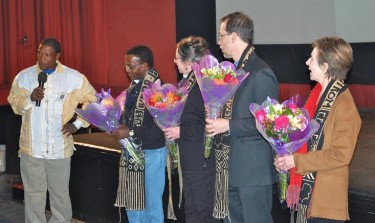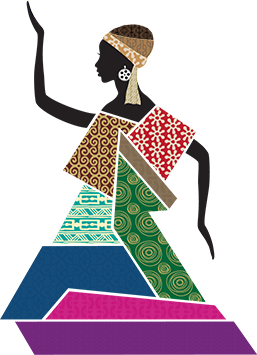The early beginnings of the Cascade Festival of African Films
By Mary Holmström

Baba Wague Diakite (left) introduces the Founders of CFAF: Joseph Smith-Buani, Linda Elegant, Michael Dembrow and Mary Holmström at the 20th Festival.
Founded in 1991, the Cascade Festival of African Films (CFAF) is the longest running African film festival in the United States. CFAF is two years older than the Pan-African Film Festival in Los Angeles and three years older than the New York African Film Festival.
How did this happen? What was going on in the late 1980s and early 1990s that sparked the birth of CFAF and other African film festivals in the United States?
On the world stage, momentous events were occurring. In 1989, the Berlin Wall fell and the Cold War ended; in 1991 the Soviet Union collapsed. Equally momentous, on February 11, 1990, Nelson Mandela was freed after 27½ years of imprisonment in South Africa, marking the beginning of the end of apartheid. Suddenly, there was the exciting possibility of a more just and peaceful world coming into being.
Around this same time, a new generation of African filmmakers, especially from West Africa, was making films that were coming to the attention of the West. Filmmakers such as Idrissa Ouédraogo and Gaston Kaboré of Burkina Faso, Souleymane Cissé of Mali, and Djibril Diop Mambety of Senegal, to name a few, were inspired by the films of Ousmane Sembène of Senegal, widely acknowledged as the “father of African cinema,” who was still making outstanding films that captivated audiences worldwide. Articles about the films from these emerging filmmakers began to appear in The New York Times, The Christian Science Monitor, The Los Angeles Times, and other major newspapers.
In addition, in 1990, California Newsreel, a progressive film distribution company based in San Francisco, established the Library of African Cinema to procure and distribute African films to universities, colleges, schools, museums, and libraries at affordable prices and in the convenient VHS video format. Also, although it received little world attention at the time, Nigeria produced its first Nigerian Home Video Film in 1992. Later dubbed “Nollywood,” the film industry in Nigeria grew with phenomenal speed over the next 22 years to become the second largest in the world today.
In Portland, in the fall of 1990, four Portland Community College Cascade Campus instructors organized and held the first Cascade Festival of African Films. Their coming together was serendipitous. Mary Holmström, who was born in Johannesburg, South Africa, had started teaching a course in African literature at the Cascade Campus in the spring of 1989. It had long been her dream to teach African literature. In the 1960s, she discovered the apartheid memoir by Es’kia Mphahlele of South Africa and the novels of Chinua Achebe of Nigeria and Ngugi wa Thiong’o of Kenya, among others. These novels changed her life. They affirmed what she had known in her heart as a child in South Africa, that black South Africans were no different from white South Africans, that they had the same hopes, dreams, fears, wants, and needs. She became convinced that if American students read these and other African literary works, their hearts and minds could be changed, too. It was gratifying to her that her African literature classes at Cascade sparked enormous interest in and curiosity about Africa among students and faculty members alike.
Linda Elegant was a poet and writer who worked in the Alternative Learning Center and taught writing and English literature classes at Cascade. Besides writing and teaching, her passion was organizing and community building. She was very eager to learn more about Africa. In the spring of 1990, she suggested to Mary that they start an African film festival. Mary responded enthusiastically, attesting that her students loved the African films she was showing in her classes to complement the African literature she was teaching.
Linda also recruited English instructor Michael Dembrow (currently Honorable Dembrow, Oregon State Senator for District 23), who taught film studies courses at Cascade. It was pure serendipity that Michael had met and interviewed the great Senegalese filmmaker Ousmane Sembène during his graduate school days in the 1970s. It was Michael who recommended Sembène’s latest film at the time, The Camp at Thiaroye, as the Opening Night film of the First Annual Cascade Festival of African Films. Last but certainly not least, Linda recruited Joseph Smith-Buani (now Dr. Smith-Buani, assistant professor of Black Studies at PSU), her colleague in the Alternative Learning Center. Joseph was a Cascade math instructor who hailed from Sierra Leone in West Africa.
To learn more about the origins of CFAF and what has helped make it one of the premier African film festivals in the country, read “A Love Story” in this issue.
January 2015 Newsletter
- CFAF celebrates its 25th anniversary with a kickoff gala and other special events
- The early beginnings of the Cascade Festival of African Films
- A Love Story
- Fast Forward
- Special for the Silver Anniversary: Founders’ Top 10!!!
- Staff Changes
- Movies in the Park goes to Africa!
- 25th CFAF Endowment Fund Campaign
- Is your Membership in CFAF current?
